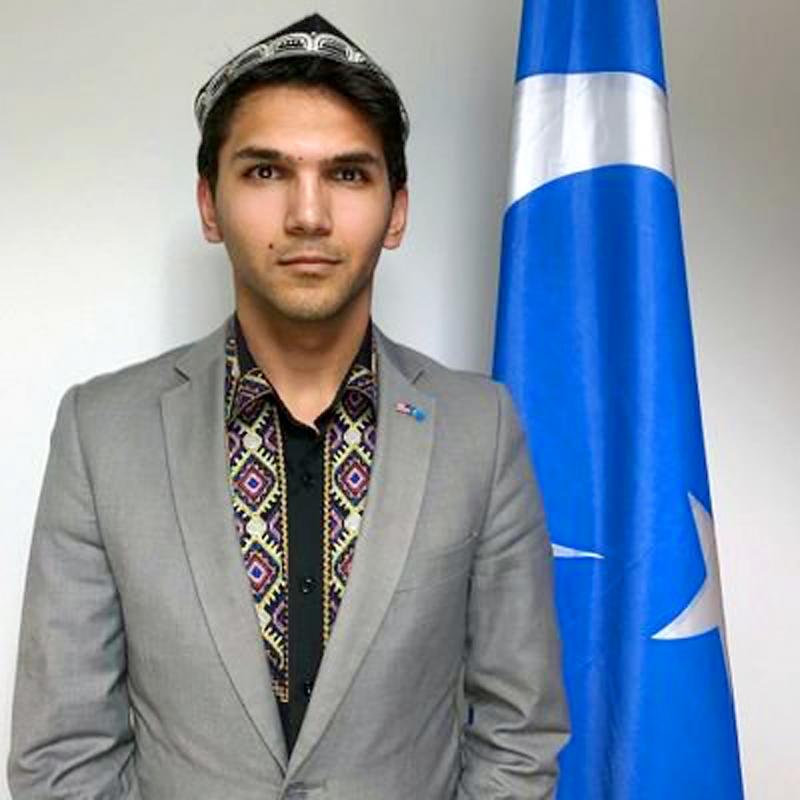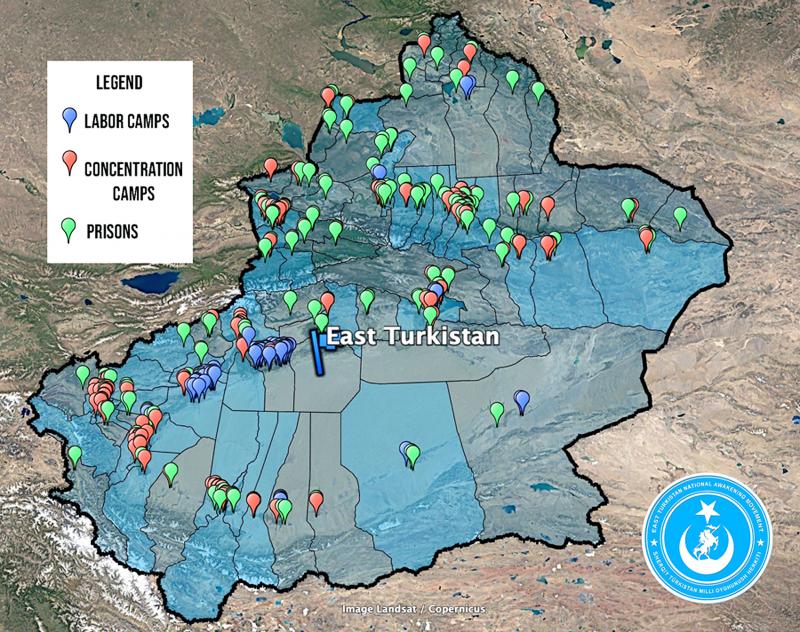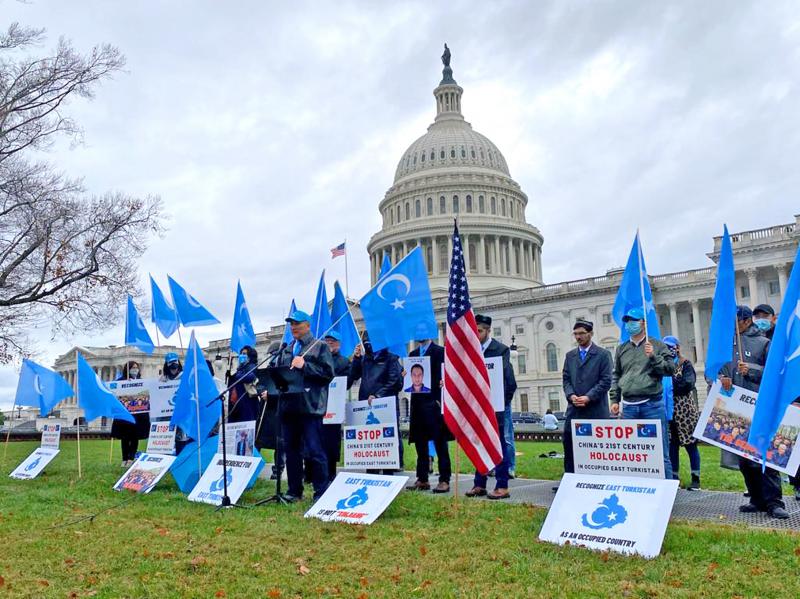When Salih Hudayar was born in the small city of Artux, East Turkestan, in May, 1993, the land of his birth had been under Chinese control for 44 years.
A Uighur by birth, Hudayar was just seven years old when he and his family moved to the US in 2000, arriving as political refugees before settling in Oklahoma, where he went to school and eventually joined the US Reserve Officer Training Corps.
Always aware of his background and family heritage, however, in 2017 Hudayar established the East Turkestan National Awakening Movement, and within 12 months was meeting members of the US Congress to promote awareness of China’s oppression of Uighur people.

Photo courtesy of Salih Hudayar
GENOCIDE IN XINJIANG
His reference to a “genocide” being carried out against his people in 2018 is now a commonly accepted term for China’s treatment of millions of predominantly Muslim Uighurs and other Turkic peoples across East Turkestan — an area Beijing refers to as Xinjiang.
In late 2019, as an increasingly prominent figure in the push for East Turkestan independence, Hudayar was elected prime minister of his nation’s government-in-exile, and early last year, the term “genocide” was echoed by former US secretary of state — and recent visitor to Taiwan — Mike Pompeo, who said “I have determined that the People’s Republic of China (PRC), under the direction and control of the Chinese Communist Party (CCP), has committed genocide against the predominantly Muslim Uighurs and other ethnic and religious minority groups in Xinjiang.”

Photo courtesy of Salih Hudayar
He added that the world is “witnessing the systematic attempt to destroy Uighurs by the Chinese party-state.”
A few days ago Prime Minister Hudayar, one of the world’s best known faces of the Uighur cause, spoke with the Taipei Times.
Hudayar last year said that world leaders have largely ignored the genocide in East Turkestan, choosing profits over humanity. Have conditions improved? “Not much has changed,” he says.

Photo courtesy of Salih Hudayar
“The Trump Administration formally recognized China’s atrocities as genocide and this has carried on into the Biden Administration with nations in Europe including the UK, the Netherlands, Lithuania, Czech Republic, Belgium and France formally recognizing the same. However, not much has been done beyond that,” Hudayar says.
In recent weeks Russian aggression against Ukraine has taken attention away from the Chinese genocide against the Uighurs.
The US and Western governments, he says, are “almost belittling themselves, begging China to step in and apply pressure on Russia.”
Chinese leader Xi Jinping (習近平) on March 18 told US President Joe Biden that the US must oppose Taiwan independence and not interfere in issues such as Tibet and Xinjiang.
This “has had a negative impact on our struggle because the international community no longer seems to be willing to apply pressure on China” because of the conflict in Ukraine, Hudayar says.
But, he adds, this isn’t about race or religion, a common claim made by the international media. Instead, “the free world being more impacted by the actions Russia will take in Ukraine” due to geographical location, “whereas in East Turkestan, Taiwan and Tibet, we’re thousands of miles away from Europe or the US.”
DOUBLE STANDARD
The world has “completely or largely forgotten, given the fact that it is now eight years since China initiated its campaign of genocide and mass internment in East Turkestan, yet you don’t see governments doing anything significant to punish China, or to uphold their obligations under the UN Genocide Convention, whereas with the Russian invasion of Ukraine you see this double standard,” Hudayar says.
“Immediately you have Western governments applying sanctions, hundreds of western companies leaving Russia and governments urging the International Criminal Court (ICC) and International Court of Justice (ICJ) to investigate Russia” although no such moves have been made to support the people of East Turkestan, who launched their own ICC case in mid-2020,” he adds.
No government has formally stepped up to urge the ICC to investigate Chinese officials for genocide, he says, adding that the international community in this regard are “remaining silent.”
Hudayar also commented on Taiwan’s approach to the Uighur and Turkic peoples’ cause, with Taipei increasingly vocal in its condemnation of the Russian invasion in recent weeks, despite being largely silent on the genocide in East Turkestan.
“There have been people in the ruling Democratic Progressive Party (DPP) and other party members who have spoken out against China’s genocide,” but on an official level the government has been relatively quiet, Hudayar says.
He also noted the large number of Chinese Nationalist Party (KMT) supporters in Taiwan who still officially view East Turkestan, Tibet and Mongolia as part of China.
“We fully support Taiwanese independence and we support the people of Taiwan,” he says. “We believe that [Taiwan is] already an independent and free nation. This is something they need to formally step up, and declare, whether there are protests from China or not.”
“However, we have the same common enemy,” he adds. “It’s crucial that we work together in as many ways as we can to cooperate and give each other mutual recognition and support in any way so we can to stand up against the PRC and the threat of the CCP.”

Taiwan has next to no political engagement in Myanmar, either with the ruling military junta nor the dozens of armed groups who’ve in the last five years taken over around two-thirds of the nation’s territory in a sprawling, patchwork civil war. But early last month, the leader of one relatively minor Burmese revolutionary faction, General Nerdah Bomya, who is also an alleged war criminal, made a low key visit to Taipei, where he met with a member of President William Lai’s (賴清德) staff, a retired Taiwanese military official and several academics. “I feel like Taiwan is a good example of

March 2 to March 8 Gunfire rang out along the shore of the frontline island of Lieyu (烈嶼) on a foggy afternoon on March 7, 1987. By the time it was over, about 20 unarmed Vietnamese refugees — men, women, elderly and children — were dead. They were hastily buried, followed by decades of silence. Months later, opposition politicians and journalists tried to uncover what had happened, but conflicting accounts only deepened the confusion. One version suggested that government troops had mistakenly killed their own operatives attempting to return home from Vietnam. The military maintained that the

Before the last section of the round-the-island railway was electrified, one old blue train still chugged back and forth between Pingtung County’s Fangliao (枋寮) and Taitung (台東) stations once a day. It was so slow, was so hot (it had no air conditioning) and covered such a short distance, that the low fare still failed to attract many riders. This relic of the past was finally retired when the South Link Line was fully electrified on Dec. 23, 2020. A wave of nostalgia surrounded the termination of the Ordinary Train service, as these train carriages had been in use for decades

Lori Sepich smoked for years and sometimes skipped taking her blood pressure medicine. But she never thought she’d have a heart attack. The possibility “just wasn’t registering with me,” said the 64-year-old from Memphis, Tennessee, who suffered two of them 13 years apart. She’s far from alone. More than 60 million women in the US live with cardiovascular disease, which includes heart disease as well as stroke, heart failure and atrial fibrillation. And despite the myth that heart attacks mostly strike men, women are vulnerable too. Overall in the US, 1 in 5 women dies of cardiovascular disease each year, 37,000 of them